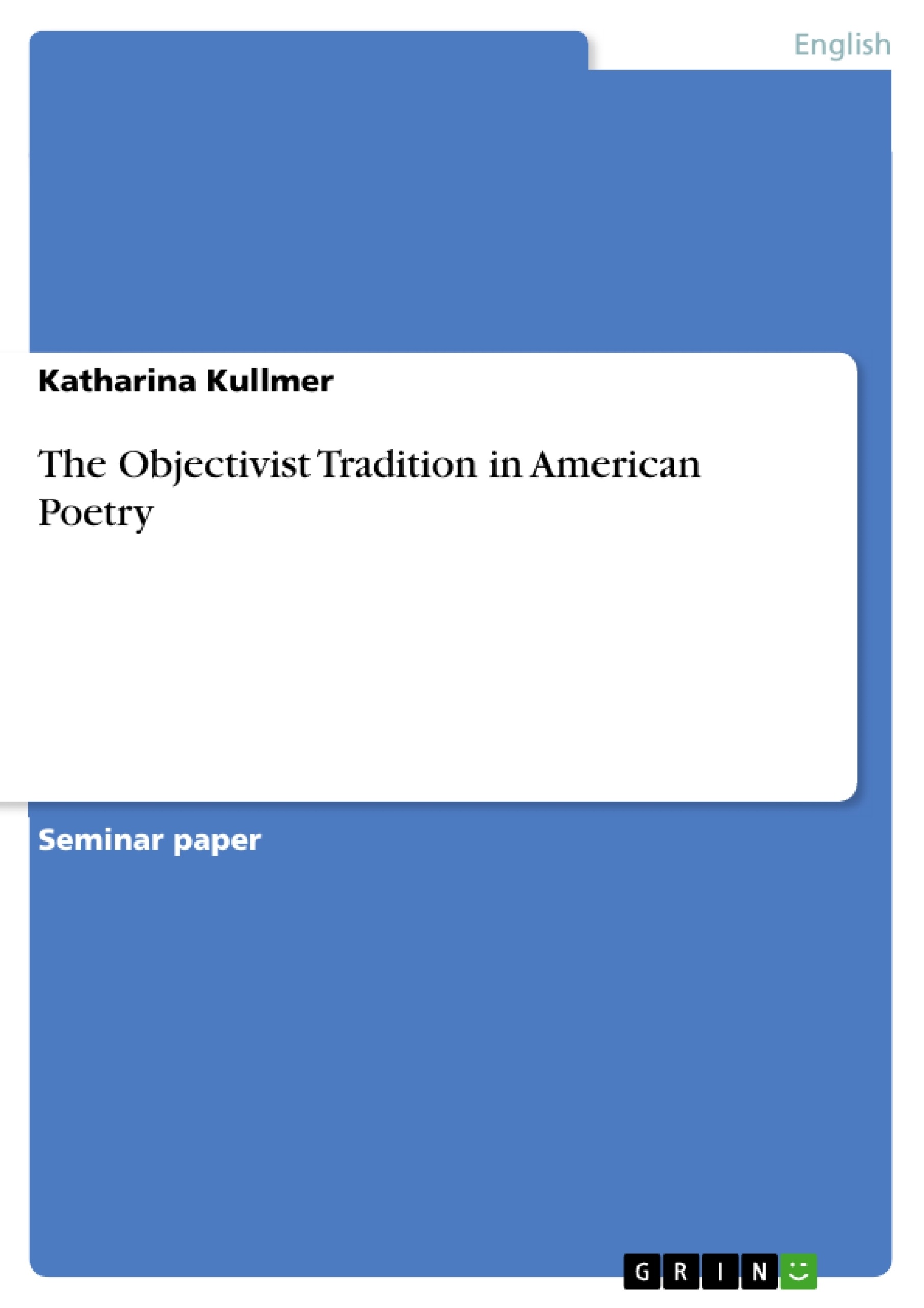"The Objectivist Tradition in American Poetry" deals with a "modern poetry" that emerged in the 1930s in the United States.
The Objectivist poets were a loose-knit group; they were mainly American and were influenced by, amongst others, Ezra Pound and William Carlos Williams. The basic tenets of Objectivist poetics as defined by objectivist poet Louis Zukofsky were to treat the poem as an object, to use no word that isn't absolutely necessary for the presentation and to emphasise "sincerity".
Inhaltsverzeichnis (Table of Contents)
- Introduction - What is Objectivism?
- Poems
- William Charles Williams: "An Early Martyr"
- Ezra Pound: "The Garret"
- Charles Reznikoff: "16"
- Louis Zukofsky: "The Immediate Aim" – 3
- Conclusion: differences and similarities
Zielsetzung und Themenschwerpunkte (Objectives and Key Themes)
This work explores the concept of Objectivism in poetry, specifically within the context of the twentieth-century modernist movement. The author examines the aims and values of Objectivist poets, emphasizing the rejection of conventional poetic structures and the pursuit of a more authentic and direct engagement with reality. The analysis focuses on the poems of William Carlos Williams, Ezra Pound, Charles Reznikoff, and Louis Zukofsky, exploring the commonalities and divergences in their approaches.
- The origins and evolution of Objectivist poetry.
- The rejection of traditional poetic structures and the pursuit of a more direct expression of reality.
- The influence of modernism, particularly the works of Ezra Pound and William Carlos Williams.
- The role of social and political themes within Objectivist poetry.
- The distinctive styles and approaches of key Objectivist poets.
Zusammenfassung der Kapitel (Chapter Summaries)
The introduction provides a concise overview of Objectivist poetry, highlighting its origins, central tenets, and key figures. It emphasizes the poets' rejection of conventional structures and their pursuit of a more direct and authentic representation of reality.
The chapter on William Carlos Williams' "An Early Martyr" explores the poem's thematic focus on injustice and social inequality, particularly as it relates to the young man's experience with the government. The chapter analyzes the poem's use of imagery, symbolism, and form to express the conflict between the individual and the oppressive forces of society.
The chapter on Ezra Pound's "The Garret" delves into the poem's exploration of class differences and the contrasts between the rich and the working class. It highlights the poem's emphasis on the importance of human connection and shared experiences over material wealth. The chapter examines the poem's use of imagery and language to create a vivid portrait of the contrasting lifestyles.
Schlüsselwörter (Keywords)
Objectivist poetry, modernism, Ezra Pound, William Carlos Williams, social justice, class conflict, direct expression, form, structure, imagery, symbolism, authenticity, political themes.
Frequently Asked Questions
What is Objectivism in American poetry?
Objectivism is a modernist poetic movement that emerged in the 1930s, treating the poem as an object and emphasizing sincerity and the removal of unnecessary words.
Who are the key poets associated with the Objectivist tradition?
Key figures include Louis Zukofsky, Charles Reznikoff, William Carlos Williams, and Ezra Pound.
What did Louis Zukofsky mean by "sincerity" in poetry?
Sincerity refers to the accurate and direct engagement with reality, using precise language that reflects the poet's immediate perception without decorative artifice.
Does Objectivist poetry address social or political themes?
Yes, many Objectivist poems, such as those by Williams and Reznikoff, deal with social injustice, class conflict, and the experiences of the working class.
How did Ezra Pound influence the Objectivists?
Pound's emphasis on Imagism and the economy of language served as a foundational influence for the Objectivist poets' focus on the poem as a constructed object.
- Citation du texte
- Magistra Artium Katharina Kullmer (Auteur), 2006, The Objectivist Tradition in American Poetry, Munich, GRIN Verlag, https://www.grin.com/document/129615



